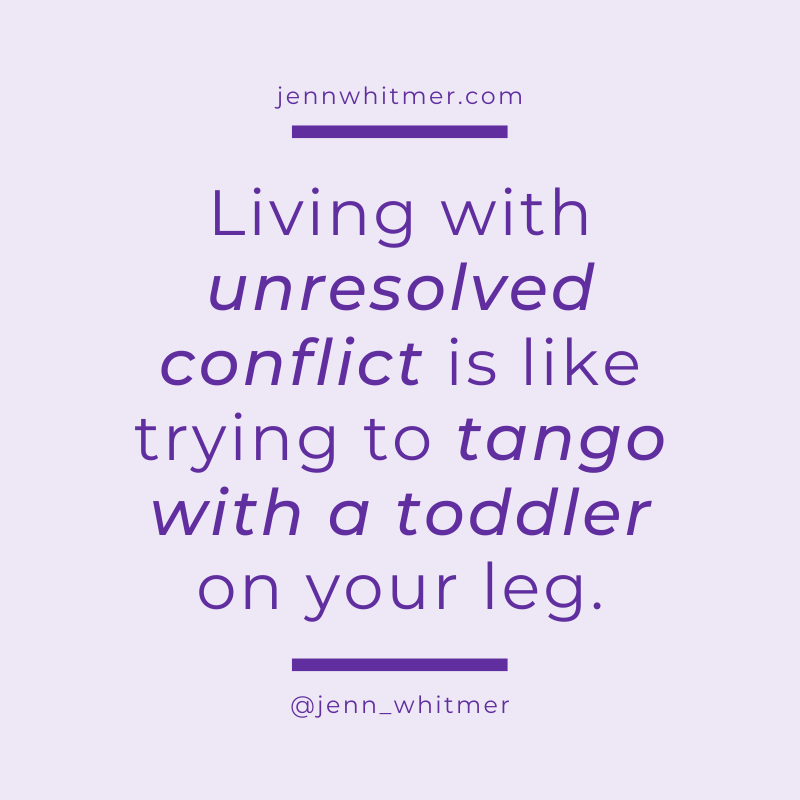Living with unresolved conflict is like trying to tango with a toddler on your leg.
Lights keep me awake. I mean, sure I can take a quick nap (boy, do I love naps). I can use a sleep mask, but it’s not quite the same. The kind of sustained rest required for flourishing—who am I kidding, just plain functioning—doesn’t happen with lights on.
Unresolved conflict is like that—you can get a little bit of rest, but not lasting freedom.
And when it’s extreme, it’s like trying to tango with a toddler on your leg.
Unresolved conflict means you literally have less brain function for the rest of life.
Neuroscience shows us unresolved conflict takes up brain energy. The brain is monitoring for conflict, wanting to move it to the front (literally the prefrontal cortex) to resolve the conflict.
Unresolved conflict means you literally have less brain function for the rest of life. I don’t know about you, but I feel like I need all my brain to manage this life!
Side note: this is why life for everyone is harder right now:
A global pandemic creates new conflicts.
Working from home and establishing different routines creates new conflicts.
Working on anti-racism creates new conflicts.
There may be a couple toddlers tripping up your tango.
Here are eight simple ideas to respond to unresolved conflict that might be taking up some space in your life.
1. Look at Yourself
Your Enneagram personality and how you see plays a role in conflict resolution. And that’s why we start here. Ask yourself, “What story am I telling myself?” and “What is my role?” From enabling to retaliating, we have a role in the conflict in virtually every circumstance. What can you do to make your part right?
Do you know how you show up in conflict? Take this quiz to find your actual problem-solving type!
2. Apologize
Do you need to apologize for the impact of your behavior, even if your intentions were good? For a mean-spirited verbal jab? For lacking patience? Apologies are relational first aid. They start the healing process.
3. Overlook
Just choose to recognize in your own heart and mind that something hurt you. Or angered or made it more difficult for you. And then let it go. Overlook the offense and resolve it for yourself.
4. Extend a Hand
Send a note or pick up the phone to say, “Hey, something doesn’t seem right between us. Is everything ok?” Just that opens up communication and begins the resolution process.
5. Write It Down
There are times when the person is out of your life out of circumstance or necessity. Yet, the unresolved conflict remains. Writing out your hurt, anger, pain can help bring peace to the situation. You can throw it away, burn it, or keep it in a journal as a place to return, to show yourself you did deal with the situation.
6. Go and Be Well
Closing the loop on a conflict can be helpful. There are times when it’s unlikely the resolution means everyone is happy and together again. It can be freeing for you (and the other person) to send a note that essentially says, “I wish you well.” It’s not a novel. Pop a note in the post (avoid electronic communication if you can) saying I hope you have peace and success in life.
7. Confront with Compassion
There are times when you do need to confront someone—because Confrontation is Kind. If the behavior is patterned, harming you or someone else, it’s time to have a challenging, but kind, conversation.
8. Get Help
You may need some help to do many of these steps. A therapist (I think everyone needs a therapist at some time in their life!), a mediator, a coach, a spiritual leader, a mentor who can help you walk through the situation. The kind of help you need depends on the struggle, but getting through unresolved conflict often requires some professional support.
I would love to help you. Let’s talk to see how coaching can help you.
Are there unresolved conflicts hanging out in your brain? What do you need to do to get some real peace and rest?
Take a step toward peace today. I bet you’ll sleep better!

COMMENTs:
0